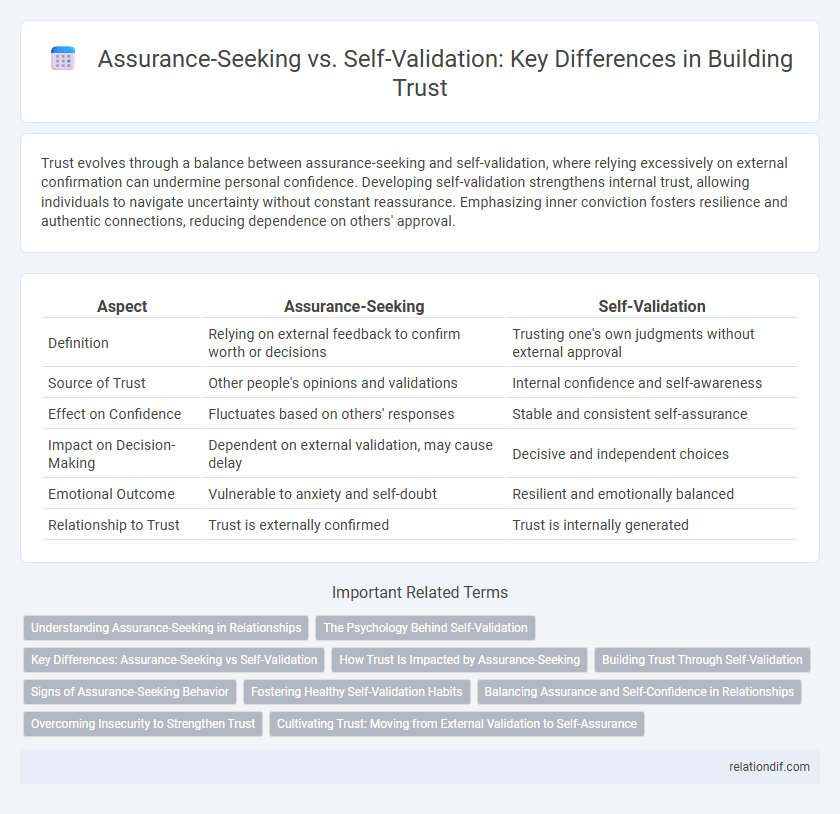Trust evolves through a balance between assurance-seeking and self-validation, where relying excessively on external confirmation can undermine personal confidence. Developing self-validation strengthens internal trust, allowing individuals to navigate uncertainty without constant reassurance. Emphasizing inner conviction fosters resilience and authentic connections, reducing dependence on others' approval.
Table of Comparison
| Aspect | Assurance-Seeking | Self-Validation |
|---|---|---|
| Definition | Relying on external feedback to confirm worth or decisions | Trusting one's own judgments without external approval |
| Source of Trust | Other people's opinions and validations | Internal confidence and self-awareness |
| Effect on Confidence | Fluctuates based on others' responses | Stable and consistent self-assurance |
| Impact on Decision-Making | Dependent on external validation, may cause delay | Decisive and independent choices |
| Emotional Outcome | Vulnerable to anxiety and self-doubt | Resilient and emotionally balanced |
| Relationship to Trust | Trust is externally confirmed | Trust is internally generated |
Understanding Assurance-Seeking in Relationships
Assurance-seeking in relationships involves actively seeking confirmation of a partner's love, commitment, and trustworthiness to alleviate insecurities and reinforce emotional connection. It contrasts with self-validation, which relies on inner confidence rather than external affirmation. Understanding assurance-seeking helps identify underlying anxieties and fosters healthier communication, enabling partners to build a more secure and trusting bond.
The Psychology Behind Self-Validation
Self-validation involves an internal process where individuals affirm their own thoughts, feelings, and values, enhancing intrinsic trust and emotional resilience. This psychological mechanism reduces dependence on external assurance by fostering self-awareness and confidence in personal judgment. Understanding self-validation helps explain why some people maintain trust in their decisions despite external doubt or criticism.
Key Differences: Assurance-Seeking vs Self-Validation
Assurance-seeking relies on external validation from others to establish one's self-worth, often creating dependency on outside opinions for confidence. Self-validation, by contrast, is an internal process where individuals affirm their own value and decisions without needing external approval. The key difference lies in the source of trust: assurance-seeking places trust in others' feedback, while self-validation builds trust within oneself.
How Trust Is Impacted by Assurance-Seeking
Trust erodes when individuals rely heavily on assurance-seeking behaviors, as repeated demands for validation can signal insecurity and reduce perceived reliability. Constant need for external affirmation interrupts the natural flow of confidence, causing others to question the seeker's self-trust and authenticity. Studies indicate that balanced self-validation fosters stronger interpersonal trust, while excessive assurance-seeking diminishes trustworthiness in relationships.
Building Trust Through Self-Validation
Building trust through self-validation involves recognizing and affirming one's own values and decisions, which fosters internal confidence and authenticity. This process reduces reliance on external approval, enabling more genuine interactions and deeper connections. Empowered self-validation strengthens resilience and transparency, key components in establishing and maintaining trust in personal and professional relationships.
Signs of Assurance-Seeking Behavior
Assurance-seeking behavior often manifests through frequent requests for confirmation, repeated questions about trustworthiness, and an intense need for reassurance in relationships or decisions. Individuals exhibiting this behavior tend to rely heavily on external validation to alleviate anxiety and uncertainty. Recognizing these signs is crucial for fostering healthier trust dynamics and encouraging self-validation skills.
Fostering Healthy Self-Validation Habits
Fostering healthy self-validation habits enhances personal trust by encouraging individuals to rely on internal standards rather than external approval, leading to greater emotional resilience and authenticity. Developing self-awareness and practicing mindfulness techniques strengthen this internal validation process, reducing dependency on others' opinions. Consistent self-validation supports mental well-being and empowers more confident decision-making in both personal and professional relationships.
Balancing Assurance and Self-Confidence in Relationships
Balancing assurance and self-confidence in relationships fosters trust by combining external validation with internal belief. Individuals who seek assurance strengthen bonds through open communication, while cultivating self-validation ensures resilience and personal growth. This equilibrium supports mutual respect and emotional security, creating a foundation for lasting connection.
Overcoming Insecurity to Strengthen Trust
Overcoming insecurity requires shifting from assurance-seeking behaviors to self-validation, which builds authentic trust in relationships. Assurance-seeking often relies on external confirmation, leading to dependency and increased vulnerability. Cultivating self-validation empowers individuals to trust themselves, fostering resilient and balanced interpersonal connections.
Cultivating Trust: Moving from External Validation to Self-Assurance
Cultivating trust involves shifting focus from assurance-seeking behaviors, which depend on external validation, to self-validation grounded in personal integrity and confidence. Emphasizing self-assurance fosters internal resilience, reducing reliance on others' opinions and promoting authentic connections. This transformation enhances emotional stability and supports sustainable, trust-based relationships in both personal and professional contexts.
Assurance-Seeking vs Self-Validation Infographic

 relationdif.com
relationdif.com